Start them off on the right paw
Nutrition and value, perfectly balanced for your pup
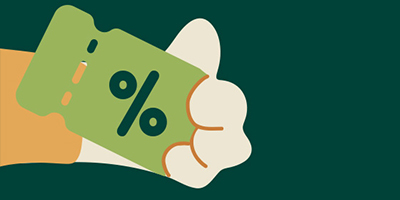
Love in every bite for precious pups
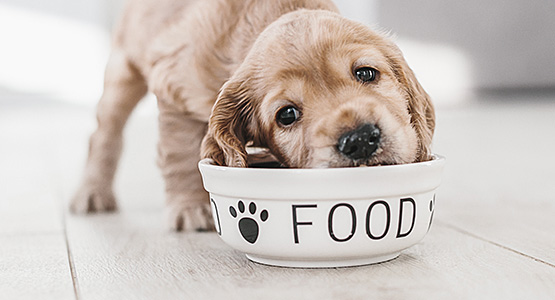
Importance of a puppy diet
Puppies require a diet that provides optimal levels of nutrients required for healthy growth, & sufficient calories to maintain energy requirements without overloading the immature digestive system. Puppies have greater structural and functional demands upon their bodies, a faster metabolic rate and a subsequently higher need for calories than an adult dog of the same weight.
Different ways to serve your playful pup's feast
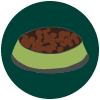
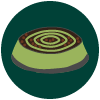

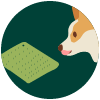
Top tips for new puppy parents
It is a legal requirement for dogs to be safely restrained in your vehicle. There are various options, but for a young puppy, a sturdy pet carrier that can be strapped in securely is generally best.
Make sure the box is lined with plastic, because your puppy will be excited and possibly a little nervous too. Place some newspaper on top and finally some bedding. Don’t put food and drink in the carrier because this will most likely end up all over your puppy during transit. It’s best for them to make their first journey on an empty tummy just in case they feel a little nauseous. If you have a long journey, make some stops for water, but be very careful to keep your puppy safe and secure whilst doing so.
A puppy’s sense of hearing is far more acute than that of a human, so if you have music on during the trip, keep the sound turned down low. A calm and uneventful ride home will help to ensure that future journeys are stress-free.
Although you will be looking forward to many happy years together with your puppy and eager to start to make a bond, it’s important to respect that your puppy may find the new environment unsettling to begin with. Leaving mum and the litter mates can be very stressful, and coupled with travelling and lots of new noises and smells to get used to, there is a lot for a new pup to deal with.
Before arrival, a cosy bed or crate placed in a warm, quiet place should be prepared. The breeder may allow you to take a blanket or favourite toy so that your pup has something that smells familiar. Crates should never be used for punishment. If your pup has not been used to one, you will need to take the time to ensure this is a desirable, calm place for relaxing, sleeping, or enjoying a snack, chew or meal in peace, and not a jail! If your puppy displays any anxious behaviours such as pacing and crying, quiet reassurance is generally what is required, and it can take several months rather than days or weeks for a puppy to properly feel at home, so do not expect too much too soon.
Tip: If your dog pup is a reluctant drinker, filtered water may be preferred. This is because water from different areas can taste very different to dogs, and unlike us, they have special taste buds just for water that are finely tuned.
Try to stick to the breeder’s feeding times as far as possible, at least for the first week. This will make it easier for you and your pup to get into a routine and help with toilet training. Eating stimulates the digestion, and most pups like to defecate within 5-30 minutes following a meal to clear the digestive tract ready for the incoming food. Excitable playtime/exercise is not recommended straight after a meal, but a little potter in the garden is fine and will usually get “things moving”. Make sure fresh water is always available.
Allow plenty of opportunities to go outside to urinate/defecate, and don’t rush your puppy. Toileting puts dogs in a vulnerable position, so be patient and allow lots of sniffing time. Reward your pup when they perform with food, play or praise/affection depending on which is the greatest motivator. Different dogs have different preferences, but almost every dog finds the Arden Grange Tasty Paste a perfect incentive.
Your puppy will need to go to the toilet after playing, after waking up, after any kind of excitement - such as the children coming home from school - and after meals. At these times, take your puppy to the same place outside and wait with him or her - even in the rain!
Gently repeating a word or phrase, such as "do your business," helps your puppy to remember what they're there for. As soon as your puppy starts to sniff/circle, offer some gentle encouragement. After toileting, give lots of praise and a special titbit to reward them.
If your pup doesn’t perform, bring them back inside and try again a little later.
If you catch your puppy about to go to the toilet in the house, say 'outside', then take them quickly to the garden to show them where you do want them to go - even if it's too late!
Do not shout at, smack or scold your puppy if they toilets indoors - even if you catch them in the act! Puppies that look 'guilty' are showing fear - and they can learn not to go to the toilet in your presence as a result, or even start poo eating to “remove the evidence”. Dogs are generally very clean creatures - but it's up to us to give them all the right opportunities to get it right. Our fact sheet all about toilet training contains more information.
For more support to help with toilet training, read our article 10 toilet training tips every new puppy owner should know!
To help your puppy to follow a peaceful bedtime routine: - Ensure the bed is in a quiet, draft-free, warm place and encourage your pup to use it to nap during the daytime too. Close curtains/blinds at night and be aware that unfamiliar noises outside can take time to get used to.
Placing the bed close to yours may offer some security if your puppy is feeling uneasy. If this is not possible and your puppy is distressed, don’t leave them to cry or bark – offer some comfort and company and then try leaving the room once settled. You may need to alter your own sleeping arrangements at the beginning (perhaps bedding down on a sofa or camp-bed so you can be close-by).
Make sure your puppy has had a chance to go to the toilet before bed. Night-time disturbances will still occur, but in time, this should reduce and eventually cease, especially if you wake early for morning toileting opportunities.
Chewing can help dogs to feel more relaxed as this is an appeasing behaviour that helps relieve stress through the release of endorphins. Allowing supervised access to a safe, appropriate chew before bed may help your puppy to settle.
A bed-time biscuit such as an Arden Grange Crunchy Bites or Training Treats may help reduce night-time hunger-pangs and acid build up as a result of an empty stomach.
Tip: Dogs like music (especially Classical and Reggae) and something restful playing in the background can have a calming effect (as well as mask unfamiliar noises outdoors such as foxes). A pheromone diffuser or spray could be beneficial too.
Puppies love to play, but they don’t always enjoy the same games. Some prefer toys they can fetch; others prefer toys they can chase or tug such as a flirt pole or knotted rope. Take the time to discover your own pup’s favourite/s. Exercising the mind is just as important as physical exercise.
Choose toys that are appropriate for your breed. Bull terriers for example (even when puppies) have notoriously strong jaws so will need something much tougher than those you would pick for a smaller terrier such as a Yorkie.
Toys should be well-made to ensure that small pieces of fabric, rubber or plastic do not get broken or chewed off and ingested which could cause an intestinal blockage. Size matters; especially when choosing balls. A sturdy ball is often very popular, but make sure it is not small enough to become lodged in the mouth as this could restrict the airway.
Any new toys should be played with under supervision at first. This will also make the game far more entertaining and stimulating for your puppy, so make sure you find the time to continue to interact, even if you are sure that the toys are safe and indestructible.
Puppies love to chew, especially when they are teething. Like toys, chews should be safe and indestructible. Hide chews are made from largely indigestible protein which can hinder the digestive efficiency. Puppies and adult dogs have also been known to choke on them, so they are best avoided. Good quality nylon chews are often ideal, and there are many natural chews available that are raw-hide free. Most pups will enjoy a specially designed hollow toy stuffed with something tasty.
You have probably already realised that your puppy has very small, very sharp, teeth - and they hurt! Most puppies try to chew anything and everything - including us. This is normal behaviour; mouthing teaches a puppy about what is alive and what isn't. Just like a toddler, your puppy will want to put objects into his mouth to see what response there is as a result.
Puppies playing together will bite each other's legs and tails - all in fun. However, if one bites too hard, the playmate will let out a yelp. This tells the other puppy that they need to be more careful next time.
In order to teach your puppy to moderate the strength of their bite, you need to let them know that biting hurts. Every time that they try to put their mouth on you, stand or sit still, yelp, then fold your arms, and turn away. When they has calmed down, you can start to give attention. Redirecting your puppy onto something to play with that they can nip is usually a good technique. Some puppies can get very over-excited and if they continue to nip you, leave the room, or pop your puppy behind a baby gate - effectively isolating them for a few moments. You will need to be consistent and repeat this behaviour every time your puppy puts their teeth on you so that they learn that nipping equals the end of the game.
Mouthing doesn't stop overnight! By teaching your puppy that there are unrewarding consequences to their biting, it should gradually become less hard and then stop altogether within a four to six week period.
Young children need to learn to be calm and to stop moving if your puppy is becoming overexcited - otherwise your puppy may think that biting is fun!
It's important to play games with your new puppy, but playing rough and tumble should not be encouraged. These games teach the puppy that it's OK to bite humans' clothes, hair or skin - which is inappropriate. Playing tug games with toys, training games and hide and seek are far safer and just as enjoyable for everyone.
Offer T&Cs: This code entitles you to 15% off puppy food bundles. Code valid from 01.04.2024 until 30.04.2024. One use per customer. No minimum quantity or spend. Items must be added to the basket and code used at checkout to receive this discount.
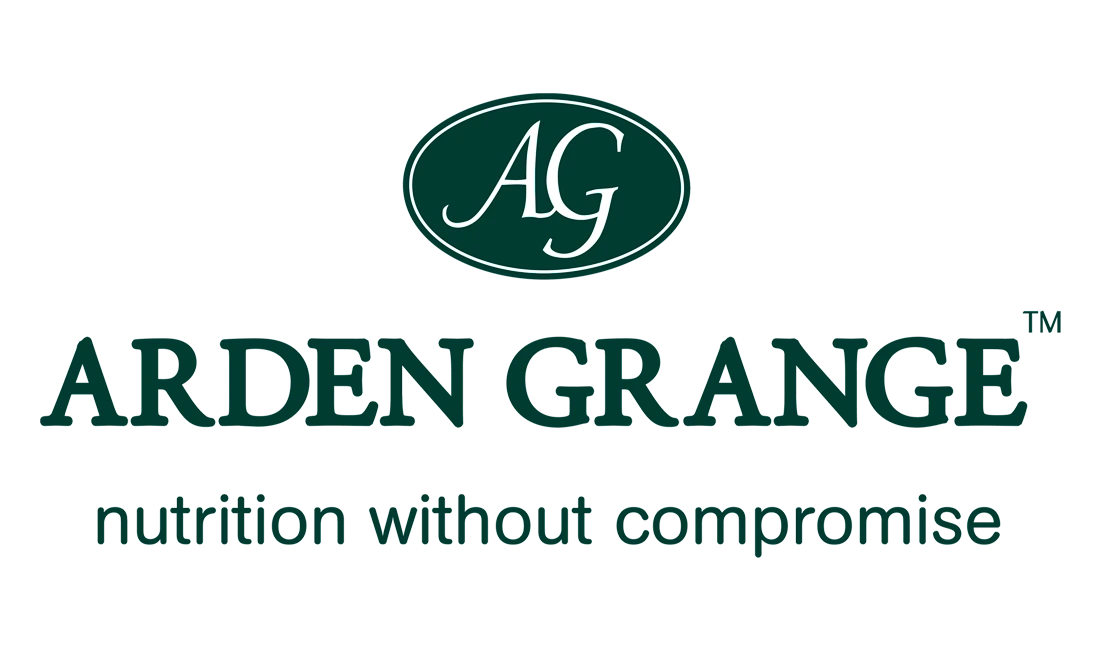
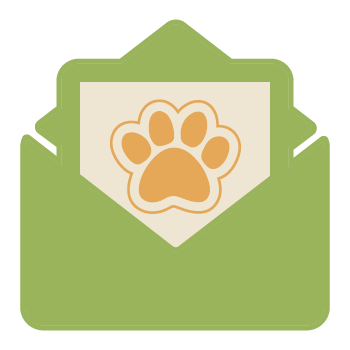
 Puppy
Puppy
 Adult
Adult
 Senior
Senior
 Sensitive
Sensitive
 Treats
Treats Kitten
Kitten
 Adult
Adult
 Senior
Senior
 Trusted British Brand
Trusted British Brand

